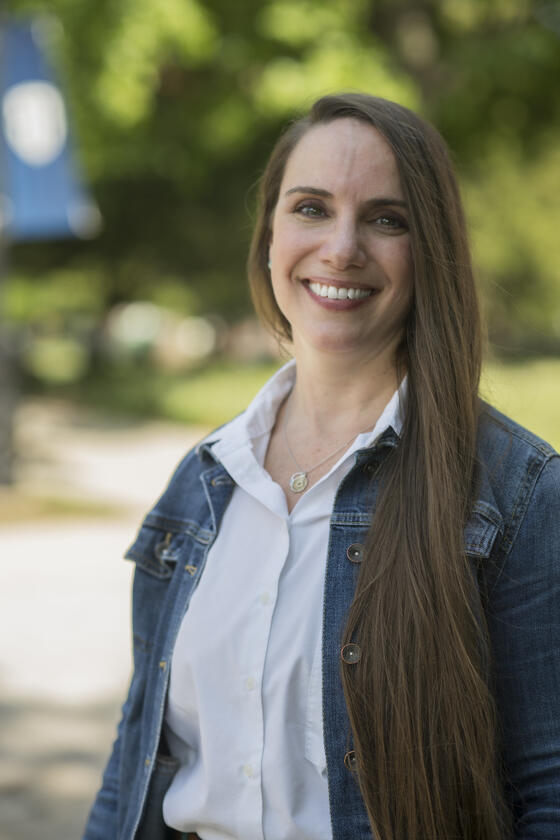
About this Program
The CACREP accredited master's degree in counseling, with a clinical mental health counseling concentration, provides a clear path to licensure – a requirement to practice counseling professionally in Maryland and neighboring states. Coursework can be planned to include earning a certificate in thanatology or trauma, crisis, grief, and loss (TCGL).
Program Overview
Tuition & Fees
Funding Opportunities
Download Counseling Brochure
The mission of the Master of Science in Counseling program at Hood College is to prepare motivated students for professional careers as counseling practitioners in the specialty areas of clinical mental health counseling and school counseling. We accomplish this by providing rigorous academic coursework and exemplary field training according to the exceptional standards set forth by the Council for the Accreditation of Counseling and Related Education Programs (CACREP). Our program also provides students with the unique opportunity to cultivate additional expertise in the disciplines of thanatology or trauma, crisis, grief, and loss (TCGL). We especially wish to inspire and prepare our students to use scholarly and research literature to inform their practice of counseling.
View Hood Talks Trauma and Society webinar with Dr. Shaine.
Professional Skills and Knowledge
The program is intended to prepare individuals to work in community mental health programs, hospitals, substance abuse clinics, at-risk youth programs, social services agencies, private counseling practices and similar settings. Instructional domains include: foundations; counseling, prevention, and intervention; diversity and advocacy; assessment; research and evaluation; diagnosis; collaboration and consultation; and leadership.
Accreditation Status
The 60-credit program was first accredited by the Council for the Accreditation of Counseling and Related Education Programs (CACREP) in Summer 2019. It received an extension of the accreditation through October 1 2027.
Rich Instruction
Faculty members are subject-matter experts whose scholarly and real-world experiences ensure that instruction is grounded in academic knowledge and practical application. Small classes mean close interaction with instructors, rich discussion among students and the kind of meaningful experiences that result from a community-based learning environment.
Methods of Instruction
Late afternoon, evening and weekend classes accommodate working adults. Courses may be taken on a full-time or part-time basis; students are encouraged to consider how they will balance the requirements of coursework and practicum/internship with other commitments.
NOTE: Students should be aware that the clinical, occupational and emotional demands of practicum and internship can make simultaneous full-time employment challenging. Few sites offer evening and weekend hours, and students are expected to be as flexible as possible. Students receive extensive support from faculty in identifying and securing a site; however, placements and specific scheduling needs are not guaranteed. Applicants should speak to faculty for further information.
HRSA Scholarship
![]()
If you are interested in working with marginalized communities, explore our HRSA Scholarship, which promotes diversity of licensed counselors in under-served regions of the country. This opportunity is generously funded by a grant from the Health Resources and Services Administration (HRSA) of the U.S. Department of Health and Human Services (HHS). To learn more, simply select the option that indicates you are interested in applying for the HRSA Scholarship on the online application for admission to our clinical mental health program.
Your completed application is not a guarantee of funding.
NBCC's National Certified Counselor (NCC) Program

The National Board for Certified Counselors (NBCC) is the premier credentialing body for counselors, ensuring that counselors who become board certified have achieved the highest standard of practice through education, examination, supervision, experience, and ethical guidelines.
The Hood College Counseling Program continues to participate in NBCC's National Certified Counselor (NCC) Application Options for Participating Universities. Students in participating programs, and who are in their final two semesters of their master's programs, have a unique opportunity to begin the application process to become a NCC prior to graduation. It should be noted that the NCC credential does not take the place of state licensure.
Counseling students who have questions or are interested in participating in either the fall or spring application cycle with NBCC should contact the NBCC Campus Coordinator, Dr. Erik Messinger, for more information. The Counseling Program Director will also share information about the application cycle on the Counseling Program's Blackboard page. Eligible students should follow the instructions outlined on Blackboard in full to be considered for the current application cycle. Eligible students who do not complete the instructions in full will be considered for the next application cycle. More information about NBCC's NCC Program can be found here.
Program Requirements
Matriculation Requirements. The Master of Science degree in Counseling, Clinical Mental Health Counseling (CMHC) specialty, is a 60-credit program. The Program of Study (see M.S. Counseling, CMHC Program of Study below) outlines required coursework. Students must maintain a 3.0 grade point average (GPA) in order to be in good academic standing and eligible for grade completion. If a student’s GPA falls below 3.0, that student must restore the GPA to a 3.0 within 9 credits completed from the term in which the GPA fell below a 3.0. See the Grade Expectations and Appeal Policy section within the student handbook for more information. All coursework and degree requirements must be met within seven years of enrolling in the first course at Hood College. Students may transfer up to 9 credits from another institution if approved by the academic adviser and program director. Failure to receive approval for course substitutions prior to enrollment may result in a delay of program completion.
In addition to coursework, students are expected to demonstrate a range of skills in the areas of academic competence, counseling skills and appropriate interpersonal behavior. These skills must be mastered in order to successfully complete all program requirements. Students who do not meet these expectations will be called upon for remediation and, in cases of gross misconduct, dismissed from the program. Failure to successfully complete a professional development or remediation plan is also means for dismissal. See the Student Retention, Remediation, Appeal, and Dismissal Policies section within the Student Handbook for more information.
Program of Study. The Clinical Mental Health Counseling Program of Study (also detailed below under M.S. Counseling, Clinical Mental Health Counseling Program of Study) outlines required coursework for completion of the 60-credit program. Full-time students take at least 9 credits in the fall, 9 credits in the spring, and 3 credits in the Summer. Program completion requires students to take 27 credits of core coursework, 12 credits of coursework related to Clinical Mental Health Counseling, 12 credits of electives, and complete a 700/hour practicum and internship.
New Student Orientation. During the first semester of enrollment, all students are required to attend the Hood College Graduate School and Counseling Program New Student Orientation. During this orientation, students will meet core faculty and receive information and policies related to the Counseling Program and curricula, students’ ethical and professional obligations, personal growth expectations as counselors-in-training and eligibility for licensure/certification.
Faculty Advisement. Students will have an assigned faculty adviser at all times during the program. Students will develop a planned program of study with their faculty adviser during the first semester of enrollment and meet with their adviser at least once (at a minimum) a year to review their progress and development. In addition to enrollment decisions, faculty advisers assist students in identifying opportunities for professional involvement, activities appropriate for students, expectations of students, policies and procedures of both the College and Counseling Program and assist with other relevant questions.
Faculty advisers review and approve all student registration information for each semester. Students are strongly encouraged to work directly with their faculty adviser in regard to course enrollment.
Assessment of Students. Each student’s progress throughout the program is assessed by examining student learning in relation to a combination of knowledge and skills. This assessment process includes an evaluation of student learning in relation to eight core areas of counseling and three core areas related to each student’s specialty area (i.e., CMHC or School Counseling). These areas directly correspond to the Hood College Counseling Program Objectives (see M.S. Counseling, Clinical Mental Health Counseling Program Objectives below). To measure student development towards these core areas, Key performance indicators (KPIs) are evaluated regularly (typically three times) as students advance through the program curricula. KPIs are primarily assessed via Key Assignment Performance Indicators (KAPAs), which are included as course assignments. Students and faculty use this information to help students develop the appropriate knowledge and skills they need to enter the counseling profession. Identified areas of strength and deficiency will be reviewed with students and, as needed, professional development plans assigned. Information from this assessment process is also used, in aggregate form, to identify programmatic trends, systematically assess program objectives and as part of the program’s annual review.
Professional Dispositions. In addition to core knowledge and skills related to professional counseling, students are also assessed at different points of the program based on professional dispositions they need to enter into the counseling profession. Professional dispositions are assessed by students, faculty and (when applicable) site supervisors as part of the Comprehensive Evaluation of Student Progress (CES-P). Counseling dispositions and professional behaviors are based on the CACREP Standards for entry-level counseling professionals (CACREP 2016, Section 2.F; Section 5.C; and Section 5.G) and the American Counseling Association (ACA) 2014 Code of Ethics (https://www.counseling.org/resources/aca-code-of-ethics.pdf). Identified areas of strength and deficiency will be reviewed with students and, as needed, professional development plans assigned.
Student Evaluation. Students have regular, systematic opportunities to formally evaluate program faculty and site supervisors. Course evaluations are administered through the Hood College Office of Institutional Research and Assessment (OIRA) at the end of each class. Students enrolled in COUN 596 Practicum, COUN 597 Internship I and COUN 598 Internship II will complete a site supervisor and faculty supervisor evaluation. This information is used at both the course and programmatic level, along with student assessment data, to help program faculty reflect on aspects of the program that work well and those that need improvement. Completion of all assessment data (course evaluations, site supervisor evaluations and the CES-P) is integral to informing programmatic and curricular decisions. See Appendix A within the Student Handbook (see Handbooks & Manuals below) for a copy of the CES-P (student version).
Note: Upon graduation from the program, graduates and employers of program graduates will be asked to complete a survey designed to evaluate the program’s overall effectiveness as related to the Hood College Program Outcomes.
Scholarship Opportunities and Loans
- HRSA Scholarship for Clinical Mental Health Counseling Program. If you are interested in working with marginalized communities, explore our HRSA Scholarship, which promotes diversity of licensed counselors in under-served regions of the country. This opportunity is generously funded by a grant from the Health Resources and Services Administration (HRSA) of the U.S. Department of Health and Human Services (HHS). To learn more, simply select the option that indicates you are interested in applying for the HRSA Scholarship on the online application for admission to our clinical mental health program. Your complete application is not a guarantee of funding.
- NBCC Foundation has several scholarships specifically for counseling students.
- Unigo.com is a free search tool that matches students with scholarships.
- Direct Unsubsidized Loans are available to graduate students and there is no requirement to demonstrate financial need.
Counseling Programs Application Deadlines
Spring Semester
Application deadline: October 1 (interviews on Oct 22 and 25)
Fall Semester
Application deadline: February 1
NeighborHood Counseling Training Center
We have a new Counseling Training Center on campus, run by our Counseling students during their field experience, supervised by our faculty members. We aim to help people in Maryland with the following:
- Adjustment and relationship issues
- Mild-to-moderate depression and anxiety
- Life transitions
- Mild-to-moderate posttraumatic stress
For more information and to contact the clinic click here.
This project is supported by the Health Resources and Services Administration (HRSA) of the U.S. Department of Health and Human Services (HHS) as part of an award totaling $1,298,013 with 0 percentage financed with non-governmental sources. The contents are those of the author(s) and do not necessarily represent the official views of, nor an endorsement, by HRSA, HHS, or the U.S. Government. For more information, please visit HRSA.gov.
Degrees Offered
- MS
Department Offering
Related Graduate Programs
Program Social Media
Are you ready to go further?
Counseling Program Information
Admission to the clinical mental health counseling specialty master’s program requires a minimum undergraduate GPA. of 3.0. Undergraduate coursework in psychology is strongly recommended.
Individuals applying to the clinical mental health counseling master’s program are required to submit:
- The online application
- Official e-transcripts from all post-secondary schools attended (should be sent via Parchment to Hood Graduate Admission or emailed to gofurther@hood.edu).
- A personal statement describing factors that influenced the decision to apply to Graduate School and how this program will facilitate fulfillment of the applicant’s professional goals (by email to gofurther@hood.edu)
- In the counseling profession, a professional is expected to recognize and appreciate individual differences. Write about an experience (or experiences) you have had working with people different than yourself? What strengths and limitations do you see in your ability to recognize and appreciate individuals who hold beliefs and/or values that differ from your own?
- A current résumé or curriculum vitae (by email to gofurther@hood.edu)
- Two letters of recommendation (one academic and one professional preferably)
All application materials should be submitted by the Counseling application deadlines.
Applicants will be contacted to schedule an interview, with online or video interviews used for applicants who live more than two hours from campus.
* Please note that a maximum of 9 credits can be transferred into the program. Please review the full graduate transfer credit policy in the College catalog.
The curriculum is designed to conform to standards set by the Council for the Accreditation of Counseling and Related Education Programs (CACREP). and, for students in the School Counseling specialty, the Maryland State Department of Education (MSDE).
Upon completion of the Hood College Master of Science in Counseling program, graduates will be able to:
- Articulate knowledge of the counseling profession and ethical practice.
- Integrate social and cultural diversity competencies into counseling practice.
- Apply theories of human development across the lifespan to counseling practice.
- Demonstrate knowledge of theories and strategies for addressing career development.
- Apply knowledge of evidence-based prevention and treatment theory and techniques to assist clients achieve their mental health goals.
- Demonstrate knowledge and expertise in group counseling theory and practice.
- Integrate knowledge of test theory with the practice of assessment in counseling.
- Demonstrate the ability to apply scholarly and research literature to counseling practice and program evaluation.
Upon completion of the Counseling, M.S., Clinical Mental Health Counseling Specialty, graduates will be able to*:
- Articulate foundational knowledge of the clinical mental health counseling specialty, including the history of clinical mental health counseling, models of clinical mental health counseling, the medical basis for mental health issues, and assessment.
- Articulate a grasp of the contextual dimensions of clinical mental health counseling, emphasizing the responsibilities of professional clinical mental health counselors as leaders, advocates, consultants, and multidisciplinary team members to maintain client continuity of care across a wide variety of contexts (legal, community, managed care, hospital systems, etc.).
- Apply clinical mental health counseling practices including prevention, intervention, and specific techniques including intake interviews, mental status examination, basic counseling skills, systems-based case conceptualization, and assessment.
* Program Outcomes 9-11 are intentionally omitted, these apply to the School Counseling Specialty Area
Our CACREP Vital Statistics Report for 2023-2024
Our Program Advisory Board Meeting Presentation for 2022-2023
Nine core courses (27 credit hours) provide a common body of knowledge for all students in the program. These courses provide a solid foundation for further specialized study in Clinical Mental Health Counseling.
COUN 500 Human Development as a Lifelong Process | 3 |
COUN 501 Professional, Legal, and Ethical Responsibilities | 3 |
COUN 502 Social and Cultural Foundations of Counseling | 3 |
COUN 503 Lifestyle and Career Development | 3 |
COUN 504 Counseling Techniques | 3 |
COUN 505 Group Dynamics, Processing, and Counseling | 3 |
COUN 506 Research and Program Evaluation | 3 |
COUN 511 Theory and Principles of Counseling | 3 |
COUN 534 Tests and Measurements | 3 |
TOTAL CREDTIS | 27 |
Required Specialty Courses
Four courses (12 credits) provide further specialized knowledge, skills and training necessary to address a wide variety of circumstances within the context of Clinical Mental Health Counseling.
COUN 530 Alcohol and Drug Counseling | 3 |
COUN 531 Diagnosis & Psychopathology | 3 |
COUN 532 Advanced Counseling Techniques | 3 |
COUN 533 Marriage & Family Counseling | 3 |
TOTAL CREDITS | 12 |
Practicum and Internship Courses (Required)
These courses provide professional practice opportunities for students to learn to apply theory and develop their counseling skills under supervision.
COUN 596 - Practicum *Practicum includes 100 hours total (40 hours direct service) at site | 3 |
| COUN 597 - Internship I | 3 |
COUN 598 Internship II *Internship I & Internship II includes 600 hours total (240 hours direct service) at site | 3 |
TOTAL CREDITS | 9 |
Electives
Students will select elective courses totaling 12 credits that will allow them to also complete one of the 12-credit graduate certificate programs currently offered by the Department of Psychology (in Gerontology or Thanatology). These certificate programs provide students with the opportunity to gain specialized expertise in working with older adults or with those who are terminally ill/bereaved.
COUN 507 Trauma & Crisis Intervention | 3 |
COUN 520 Introduction to Thanatology | 3 |
COUN 521 Grief and Loss | 3 |
COUN 523 Dying & Principles of Care for the Dying | 3 |
COUN 528 Developmental Perspectives in Thanatology | 3 |
COUN 543 Counseling Youth | 3 |
COUN 554 Social Gerontology | 3 |
COUN 555 Psychological Aspects of Aging | 3 |
COUN 556 Health and Aging | 3 |
COUN 575 Independent Study | 1-3 |
COUN 590 Teaching Assistantship | 1-3 |
COUN 595 Independent Research Project | 3 |
COUN 599 Special Topics in Counseling | 1-3 |
TOTAL CREDITS | 12 |
Specialization Options
A student who wishes to earn master’s degrees in both and Clinical Mental Health Counseling and School Counseling would be required to complete all specialty courses and a 600-hour internship within both the first and second specializations. Additional state requirements for licensure eligibility in the second specialization may apply.
WELCOME
The information included below is useful to prospective, current, and even graduates in that it provides you with a plethora of information. Please note, however, these handbook/manuals do not contain the complete and exact text of all rules, regulations, policies, and procedures that relate to graduate students at Hood College. The Hood College Catalogue also contains policies, procedures, and information about services for graduate students and should be used in conjunction with this program-specific handbook.
Student Handbook
The Hood College Counseling Student Handbook includes a detailed description of program mission and program objectives; faculty information; plan of study for CMHC and School Counseling; matriculation requirements; and program and university policies (including expectations of students and policies related to endorsement, academic appeals, retention, and remediation. The handbook also provides information about licensure and certification; professional counseling organizations; and opportunities for professional involvement. Students will find a long listing of recommended resources for personal counseling at the end of the Student Handbook. We encourage ALL students to go through the handbook multiple times throughout the program, as it provides valuable information at different points in your learning.
Practicum & Internship Training Manual
The purpose of the Practicum & Internship Training Manual is to provide detailed information about the field experience requirements within the Clinical Mental Health Counseling and School Counseling M.S. programs at Hood College. Students, field site supervisors, agency representatives, and faculty instructors involved in the practicum and internship process should all familiarize themselves with the content of this manual and bring any questions to the Practicum and Internship Coordinator (PIC). It is the responsibility of each student embarking on practicum and internship to be aware of the requirements, policies, and procedures guiding these experiences, as outlined in this document. Additional questions and clarifications can be addressed with Dr. Amber Samuels, Practicum and Internship Coordinator (samuels@hood.edu).
Practicum Internship Manual (Fall 2022)
Additional Information
24 Months
Average Completion Time
60 Total Credits
Program Contact

Program Director

Director of Graduate Admissions

Graduate Faculty Focus | Stephanie Snyder
"Having the opportunity to help support a low cost to free mental health clinic for both community members and Hood students, along with supervising and providing the structure needed for optimum growth and learning, is very fulfilling."

Graduate Assistant Focus | Autumn Smith
"I chose to pursue my education as a counselor at Hood because I appreciate its proximity to D.C., its affordable tuition and its small class sizes."
Graduate Student Focus | Brittany Spoor
"The counseling program at Hood College stood out for me above other programs because it is CACREP-accredited. It was also a top choice because of the faculty expertise, small class sizes, the opportunities provided to students, and sense of community Hood provides."






